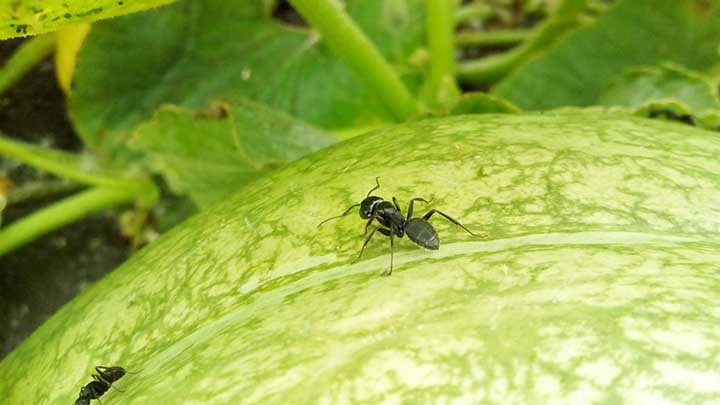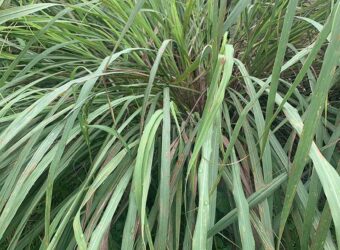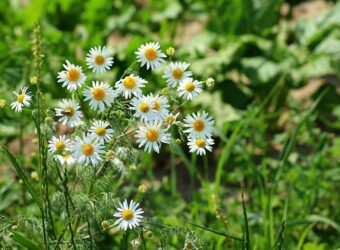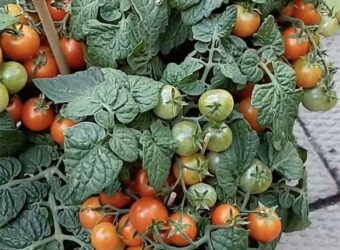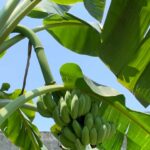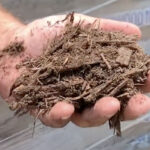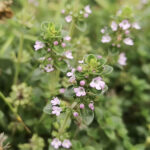Most people grow pumpkins to eat and enjoy. Unfortunately, while not all ants are bad, some sting like fire ants. So you may be wondering, “How do I keep ants off my pumpkin plants?”
Fire ants hurt when they sting you as you work in your pumpkin patch. Other ants may protect pests that damage your pumpkins. Here is how to keep problem ants off your pumpkin plants.
How Do I Keep Ants Off Pumpkin Plants?
While many people swear by home remedies, the best ways to keep ants off your pumpkin plants are baits, products containing Spinosad, and pyrethrins. D-limonene is also effective. While baits are spread outside the pumpkin patch, the other substances are approved for organic vegetable gardening with some restrictions.
Why Are Ants On My Pumpkin Plants?
Ants are on your pumpkin plants for four main reasons:
- First, ants may suck the sap out of the pumpkin plants to get the liquid they need to live. Ants can kill a seedling or even a larger plant.
- Ants sometimes “farm” insects that excrete honeydew so the ants can eat the honeydew, a sweet, sticky substance.
- Ants eat insects and may be hunting for them on your pumpkins.
- Fertile soil that is loose and moist is easier to dig in, so gardens are attractive places for ants to build their nests.
Will Ants Hurt My Pumpkin Plants?
Some ants can harm your pumpkin plants. If they attack seedlings or young plants, ants can kill t em. Ants that like honeydew protect aphids, mealybugs, and scale insects because they excrete honey. The pests will hurt your pumpkin plants. Finally, the ants can seriously sting you if you live where fire ants are found.
Are There Any Benefits of Ants to Pumpkins?
Most native ants, which have a large center hole in their mounds, are beneficial.
- They eat insects. The fewer insects on your pumpkin plants, the less damage the plants will suffer.
- As the ants go from flower to flower in search of insects, they help pollinate the pumpkin plants.
- As ants tunnel around, they aerate the soil and help organic matter decompose faster.
- Ants are food for birds, mammals, and some reptiles and amphibians.
Do You Need to Get Rid of Ants on Your Pumpkin Plant?
Most native ants are beneficial insects. These ants should be left alone. Fire ants and other invasive species are a problem and should be removed from your pumpkin patch.
How to Keep Ants Off Pumpkin Plants without Damaging Your Plant
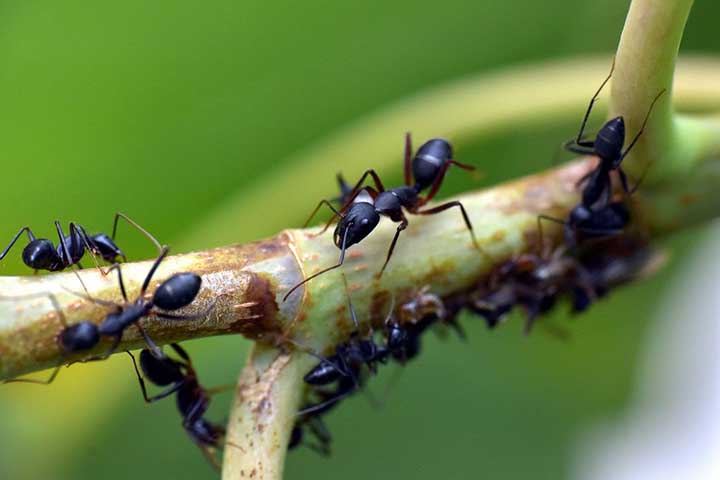
Many popular home remedies are damaging to plants. Here are some of the most common ways to keep ants from your plants and their benefits and risks.
Boiling Water
Boiling water may kill many ants in a colony, but the queen is usually kept at the bottom of the nest. Unless you kill the queen, the nest will just come back. Getting enough boiling water on the mound at one time to reach the queen is almost impossible.
Using boiling water too near your plants will kill them, too.
Boric Acid
Mixing boric acid and jelly to make bait and placing it around the ant mounds and trails will kill the ants. The boric acid affects the stomach and nervous center of the ants. Boric acid is a slow killer, taking several weeks to kill the nest. Therefore, you will have to keep putting the bait out until the nest dies.
Boric acid is toxic to humans, pets, and other animals. Excess boron, found in boric acid, can kill your plants. Boric acid is not allowed in organic gardens.
D-limonene
D-limonene is better known as citrus oil. Citrus oil will kill ants if mixed into a drench and poured on the ant mounds. Doing this early in the morning gives you the best chance of killing the queen, who moves higher in the nest during the ni ht. D-limonene is allowed in organic gardening.
Like all horticultural oil, D-limonene will kill your plants in high concentrations, especially if used in hot temperatures. In addition, d-limonene is a skin irritant and can cause severe damage if the fumes are inhaled.
Spinosad
Spinosad is a natural substance made by a soil bacterium. Spinosad is toxic to insects but not to other animals or birds. However, ants do take a while to die from Spinosad, and you may have to reapply it after rain.
The advantage of Spinosad is that it can be used in the garden and will not hurt your pumpkin plants. In addition, Spinosad is allowed in organic gardening.
Diatomaceous Earth
Diatomaceous earth is made of the skeletons of diatoms, small pond organisms. When applied to ant mounds and ant trails, it has two effects. First, Diatomaceous earth is scratchy and cuts into the exoskeleton, letting the ants dehydrate. When eaten, diatomaceous earth damages the throat and stomach of the ant. While diatomaceous earth will kill individual ants and sometimes make them move the nest, it rarely kills the whole n st. Diatomaceous earth is allowed in organic gardening.
Wear a mask when using diatomaceous earth to keep from inhaling it.
Pyrethrins
Pyrethrins are from some types of chrysanthemum flowers. Crushed, dried chrysanthemum flowers are sold as pyrethrin powder. When applied to ant mounds, pyrethrins rapidly kill all the ants in the ne ts. Some pyrethrins are allowed in organic gardening with some restrictions.
Pyrethrins are highly toxic to fish and other aquatic creatures. This pesticide is also toxic to beneficial insects such as bees and butterflies. Pyrethrins are skin irritants and can make you sick if consumed or inhaled. These pesticides are toxic to pets who eat or lick them off their skin.
Ant Bait
Ant baits are not approved for use in vegetable gardens. Ants forage widely, however, so applying the ant bait around the perimeter of the pumpkin patch will kill them. Spread the ant bait with a hand fertilizer spreader in the even ng. Ant baits take several weeks to be effective, and you will have to reapply them according to the label directions until the ants are gone.
If spread according to label directions, ant baits are safe. Because each granule is so small, it is unlikely that pets, children, other mammals, or birds will eat enough to make them sick. Native ants will eat ant bait, which will kill them, so consider that when deciding whether to use this product.
Remove Insect Pests that Excrete Honeydew
One of the things that attract fire ants to your pumpkin plants is the presence of insects that excrete honeydew. Aphids, mealybugs, and other insects will be protected from predators by the fire ants. Getting rid of the pests will force the ants to move elsewhere. Neem oil is effective against honeydew excreting insects. Because the insects must eat the neem oil to be harmed, bees and other pollinators are not at risk.
Be cautious about using neem oil in hot weather. Horticultural oils can cause phytotoxicity in plants when the temperature is high. However, Neem oil is allowed in organic gardening.
General Cautions
Always wear plastic gloves when using any substance to kill a ts. Some of these products are skin irritants, and some can be absorbed through the skin into your body and make you sick. A mask will keep you from inhaling these substances, too.
Ants feed most at dusk and dawn. Most ant baits have oil in them to attract the ants. These oils can go rancid when hot, so spreading the baits in the evening right before dusk will keep them fresh while the ants are foraging.
Ant baits and many other products mentioned here must be reapplied after rain. Most take several applications to kill the whole ant nest.
In summary, most native ants are beneficial. Fire ants and other invasive species of ants are pests. Removing any pests that the ants can exploit for food, such as aphids, mealybugs, and scale insects, will help drive the ants away. If the ants continue to be a problem, you can use several substances to eliminate them. Unfortunately, most of these take several weeks to work and must be reapplied after rain.
